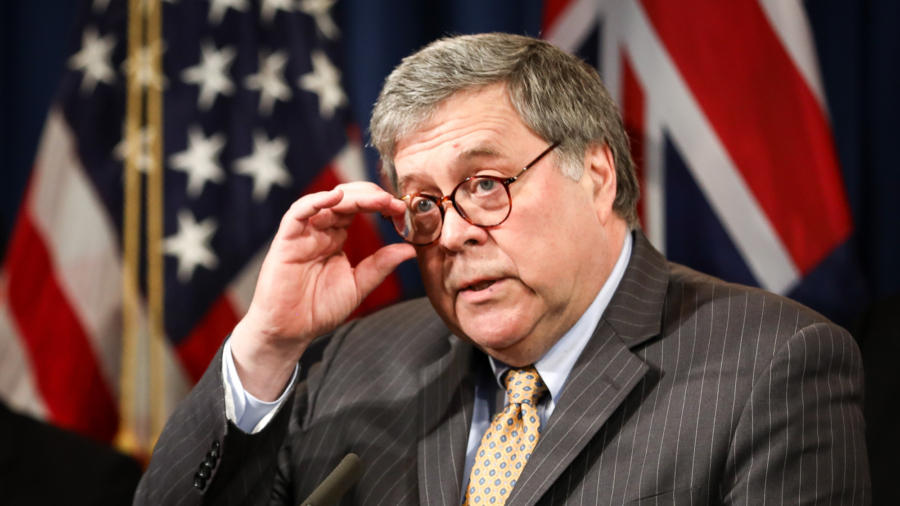The Department of Justice (DOJ) said that Attorney General William Barr played no role in the redactions made in special counsel Robert Mueller’s report and that a judge has questioned the department’s work with “no basis.”
DOJ spokeswoman Kerri Kupec said March 6 that the redactions in the public Mueller Report were made by DOJ attorneys in consultation with senior members of Mueller’s team, prosecutors in the U.S. Attorney’s Office and members of the Intelligence Community.
The report was then reviewed again by career attorneys, including lawyers with expertise in FOIA (Freedom of Information Act) cases, in response to a FOIA lawsuit by BuzzFeed, its investigative journalist Jason Leopold and Electronic Privacy Information Center (EPIC), a privacy non-profit.
Barr played no role in the process, Kupec said.
The DOJ made the statement in response to a judge who ordered Barr to show him the unredacted version of the Mueller Report, which detailed the results of an investigation into allegations of collusion between Russia and the 2016 campaign of President Donald Trump.
On May 17, 2017, Mueller was appointed as special counsel by the then-Attorney General Rod Rosenstein to investigate “any links and/or coordination between the Russian government and individuals associated with the campaign of President Donald Trump.” He concluded the investigation in March 2019 and submitted the report (pdf) to Barr on March 22, 2019.
Barr told Congress in a March 22, 2019, letter (pdf) that he would inform Congress about the principal conclusions of the Mueller report as soon as the weekend of March 23-24. He sent Congress a letter (pdf) with a summary of Mueller’s principal conclusions on March 24, 2019.
The redacted Mueller report was released to the public on April 18, 2019. Barr held a press conference about the release and sent a letter (pdf) to Congress early the day before the release.
In a March 5 opinion (pdf), Washington district judge Reggie Walton—an appointee of President George W. Bush presiding over the FOIA case—said there were inconsistencies between the redacted Mueller report and Barr’s public statements, including his March 24 summary of Mueller’s principal conclusions, his remarks during the press conference and his April 18 letter.
Walton also said that Barr may have made the statements in an attempt to “influence public discourse” over the report in favor of President Donald Trump.
“The inconsistencies between Attorney General Barr’s statements, made at a time when the public did not have access to the redacted version of the Mueller Report to assess the veracity of his statement, and portions of the redacted version of the Mueller Report that conflict with those statements cause the Court to seriously question whether Attorney General Barr made a calculated attempt to influence public discourse about the Mueller Report in favor of President Trump despite certain findings in the redacted version of the Mueller Report to the contrary,” Walton wrote.
In response, the DOJ said last week Walton’s assertions were “contrary to the facts.”
“In the course of deciding that it would review the unredacted report, the court made a series of assertions about public statements the Attorney General made nearly a year ago. The court’s assertions were contrary to the facts,” Kupec stated.
Mueller Report vs Barr’s March 24 Summary
Regarding the inconsistencies Walton noted between the report and the summary, he gave two examples.
“Barr’s summary failed to indicate that Special Counsel Mueller ‘identified multiple Contacts … between Trump [c]ampaign officials and individuals with ties to the Russian government,’” he said, noting that Mueller was appointed, among other things, to examine any alleged Trump-Russia “links.”
Having contacts with people tied to Moscow is not in itself illegal. It’s been widely reported since 2016 that Trump campaign associates had such contacts.
Walton further said that “Mueller only concluded that the investigation did not establish that ‘these contacts involved or resulted in coordination or a conspiracy with the Trump [c]ampaign and Russia’ … because coordination … ‘does not have a settled definition in federal criminal law.'”
In his report, Mueller appears to have worked out his own definition of “coordination.” Based on that definition, his probe didn’t establish that any Trump-Russia coordination occurred.
On the question of whether Trump obstructed justice, Barr’s summary said that the report doesn’t make a conclusion “one way or the other” and “leaves unresolved what the Special Counsel views as ‘difficult issues’ of law and fact concerning whether the President’s actions and intent could be viewed as obstruction.”
Walton said that Barr didn’t mention that one of the “difficult issues” Mueller encountered was a longstanding Justice Department policy that a sitting president can’t be indicted.
However, Mueller clarified in his congressional testimony that it was “not the correct way to say” that he didn’t charge Trump for obstruction because of the policy.
“As we say in the report and as I said in the opening, we did not reach a determination as to whether the president committed a crime,” he said.
Barr previously said that the policy would only stop Mueller from indicting Trump, but that he “could’ve reached a decision” on whether Trump obstructed justice. Barr added that Mueller “had his reasons” for not making a conclusion, but declined to explain further.
In absence of a conclusion from Mueller, Barr and Rosenstein, his deputy at the time, said that the evidence “is not sufficient to establish that the President committed an obstruction-of-justice offense.”
“Our determination was made without regard to, and is not based on, the constitutional considerations that surround the indictment and criminal prosecution of a sitting president,” Barr said in the March 24, 2019, summary.
Epoch Times reporter Petr Svab contributed to the report.
From The Epoch Times

